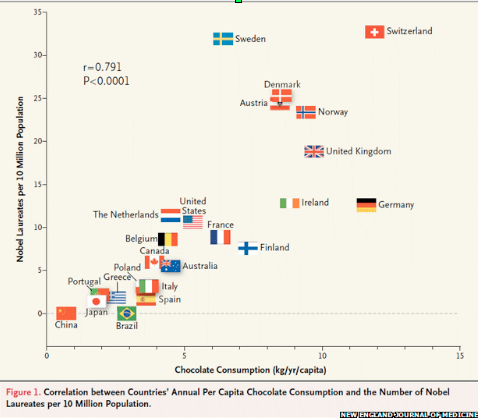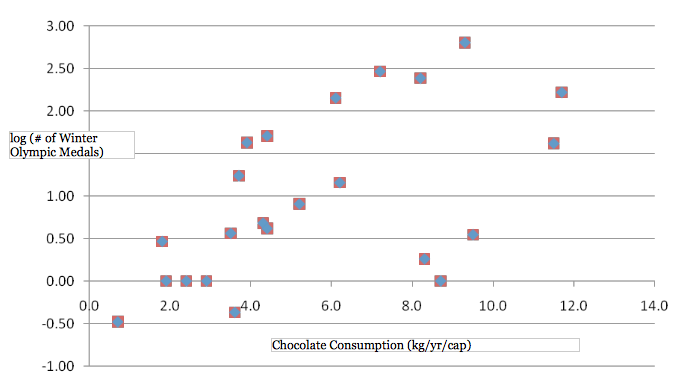
I don't know how many of you saw this article in the New England Journal of Medicine published on October 10, 2012 (Chocolate Consumption, Cognitive Function, and Nobel Laureates). In it, the author, Franz H. Messerli, M.D., claims to have found a strong linear correlation (r=.791) between the amount of chocolate consumed by a country and the number of Nobel Prize winners from that country, both measured on a per capita basis. Dr. Messerli is a cardiologist and director of Clinical Hypertension with St. Luke's and Roosevelt Hospital.
Here are his findings:

Via the New England Journal of Medicine
While Messerli warns in his paper that the existence of a correlation does not imply causation, this did not stop the popular media from running stories with these headlines:
"Eating Chocolate May Help You Win Nobel Prize" - CBS News
"Correlation Between Country's Chocolate Consumption And Nobel Prize Winners 'Surprisingly Powerful,' Says Study" - Associated Press
"Why Chocolate Makes You Smart (or Peaceful)" - Psychology Today
"Study links eating chocolate to winning Nobels" - USA Today
Messerli's results immediately got my attention because I have been doing a lot of work lately on sugar and how deleterious it is to one's diet and its links to obesity, and chocolate often finds itself attached to sugar when consumed.
I decided to do my own study to make a point. I decided to see if there was a correlation between the amount of chocolate a country consumes and the number of Winter Olympic medals the country has won over time, both measured on a per capita basis.
Here are my results:

While my correlation statistics are not quite as good as Dr Messerli's, certainly they are strong enough to get published in any respectable academic journal (correlation coefficient =.57). Note: The correlation would have been even better if the Danes and the Irish, both big consumers of chocolate had more than only one Winter Olympic medal won between them.
So what is going on here? Can eating chocolate make you more likely to win a Nobel Prize? If so, then by the same logic it appears that eating chocolate can make you a better skier or skater.
Unfortunately, I don't believe either of these suppositions is correct. I think these false correlations exist because chocolate consumption, Nobel Prize winning and Winter Olympic medals are all correlated with something else which is not ever raised in these studies.
What might that something else be. I would argue chocolate consumption, Nobels and Winter Olympic medals increase with the following factors:
- The average income of a country
- Whether the country is majority white
- Whether the country is in northern Europe
- Whether the country is Scandanavian
- Whether the country is Sweden (the decider of Nobels)
If these are the true causal variables to how much chocolate is consumed, one cannot conclude that eating more chocolate makes you smarter, or, a better skier.
This is a classic problem in statistics known as the omitted variable problem. You can get very good correlation statistics between two, or here three variables which may not be causally related at all, but rather, both are correlated and caused by a third yet undisclosed variable.
Alas, if you want to get smarter you will have to go back to reading books and if you want to ski better you will have to hit the slopes. But, if you want to get fat, just keep eating sugar-laced chocolate treats.
John R. Talbott is a best selling author and economic consultant to families whose books predicted the housing crash and the economic crisis. You can read more about his books, the accuracy of his predictions and his financial consulting activities at www.stopthelying.com